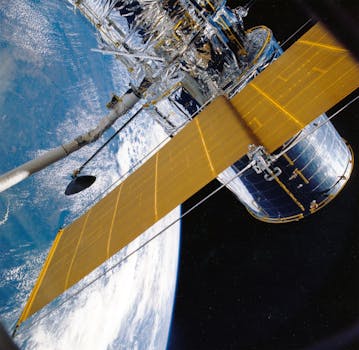The Future of Satellites: Revolutionizing Global Communication and Exploration

The Future of Satellites: Revolutionizing Global Communication and Exploration. The future of satellites holds immense promise for revolutionizing global communication, exploration, and innovation. With advancements in technology, satellites are becoming more efficient, cost-effective, and versatile. Satellites have been a crucial part of our daily lives, providing us with navigation, communication, weather forecasting, and remote sensing capabilities. As we move forward, the role of satellites is expected to expand, enabling new applications and services that will transform various industries and aspects of our lives.
In recent years, the satellite industry has witnessed significant growth, driven by the increasing demand for satellite-based services, advancements in technology, and the emergence of new players in the market. The development of smaller, more affordable satellites, such as CubeSats and nanosatellites, has made it possible for new companies and countries to participate in the satellite industry. This has led to a proliferation of satellites in orbit, with thousands of new satellites expected to be launched in the coming years.
The future of satellites will be shaped by several key trends and technologies. One of the most significant trends is the development of satellite constellations, which involve launching multiple satellites into orbit to provide global coverage and connectivity. These constellations will enable the provision of high-speed internet, navigation, and communication services to remote and underserved areas, bridging the digital divide and fostering economic growth.
Another important trend is the advancement of satellite technology, including the development of more efficient propulsion systems, advanced materials, and sophisticated sensors. These advancements will enable satellites to operate for longer periods, collect more accurate data, and provide better services. The use of artificial intelligence and machine learning will also become more prevalent in satellite operations, enabling autonomous decision-making, improved data analysis, and enhanced cybersecurity.
In addition to these trends, the future of satellites will also be shaped by the growing demand for Earth observation and remote sensing capabilities. Satellites will play a critical role in monitoring climate change, tracking natural disasters, and managing natural resources. The use of satellite-based Earth observation will also become more widespread in various industries, such as agriculture, forestry, and urban planning, enabling more informed decision-making and more efficient use of resources.
The future of satellites will also be influenced by the development of new applications and services, such as satellite-based navigation, communication, and weather forecasting. The use of satellites will become more integrated with other technologies, such as the Internet of Things (IoT), 5G networks, and autonomous systems, enabling new use cases and business models. The growth of the satellite industry will also create new opportunities for entrepreneurship, innovation, and job creation, driving economic growth and development.
However, the future of satellites also poses significant challenges, including the risk of space debris, cybersecurity threats, and regulatory issues. The increasing number of satellites in orbit raises concerns about the potential for collisions and the accumulation of space debris, which can pose a threat to operational satellites and the environment. The use of satellites also raises cybersecurity concerns, as satellites can be vulnerable to hacking and other forms of cyberattacks.
To address these challenges, it is essential to develop and implement effective regulations, standards, and best practices for the satellite industry. This includes establishing clear guidelines for satellite operations, debris mitigation, and cybersecurity, as well as promoting international cooperation and collaboration. The development of new technologies and innovations will also be critical in addressing these challenges and ensuring the long-term sustainability of the satellite industry.
In conclusion, the future of satellites holds immense promise for revolutionizing global communication, exploration, and innovation. With advancements in technology, the development of new applications and services, and the growth of the satellite industry, satellites will play an increasingly important role in shaping our world. However, it is essential to address the challenges posed by the growth of the satellite industry, including the risk of space debris, cybersecurity threats, and regulatory issues. By working together to develop and implement effective regulations, standards, and best practices, we can ensure the long-term sustainability of the satellite industry and unlock its full potential for the benefit of humanity.




